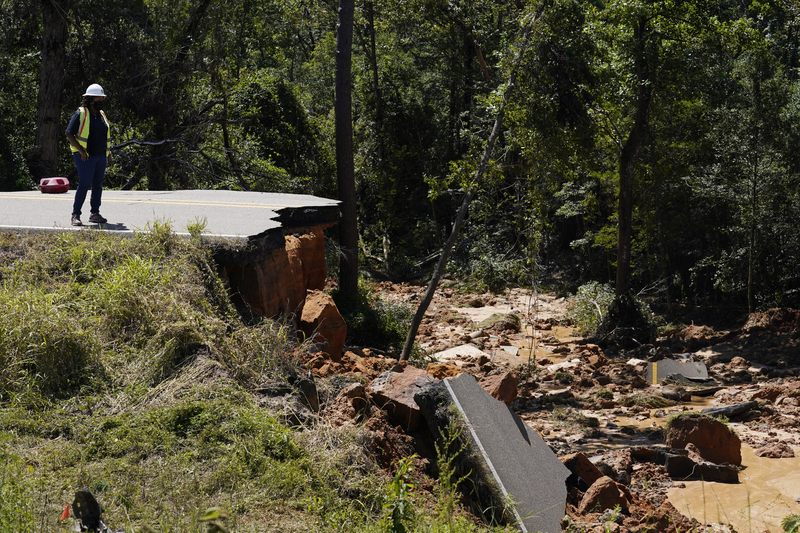Melissa Harris-Perry: Hey, y'all. Back with The Takeaway, I'm Melissa Harris-Perry. Hurricane Ida was brutal to Louisiana, but she battered Mississippi as well. Mississippi experienced flash floods and at least two deaths from the storm. As of today, tens of thousands are still without power. The pandemic is also exacting a heavy toll on the state. Only 46% of Mississippi residents are fully vaccinated, and because the state already operates with a critical shortage of doctors and nurses, the pandemic has brought the state's healthcare system to the brink of collapse. Anita Lee is a reporter for The Sun Herald based in Biloxi, Mississippi. Anita, welcome to the show.
Anita Lee: Thank you for having me.
Melissa Harris-Perry: Anita., you did some reporting from the areas that were flooded by Ida. What did you see out there?
Anita Lee: Some businesses had water in them. A lot of people had to evacuate their homes. We have 164 homes damaged, 42 destroyed, but it was encouraging to see that many people's homes were okay because they are elevated now. Hurricane Katrina was a storm that we had 16 years to the day earlier. After that storm, the entire Mississippi coastline was destroyed in Katrina and many people elevated their homes. The water was under houses and people were going in and out in rowboats and getting to their houses.
Melissa Harris-Perry: It seems like Mississippi learned some really important structural and planning lessons from Katrina and that Ida hit Mississippi in some ways that were similar to how Katrina hit it, right? That it was a water event. With Louisiana, you had the issue of the levies, which wasn't what had happened in the context of Mississippi.
Anita Lee: Right. The winds here were, for the most part, tropical storm strength. We might have had some hurricane gust and in Hancock County, which is the county neighboring Louisiana. Most of the damage we had here was from the water.
Melissa Harris-Perry: Now, talk to me about the other disaster which is underlying. Katrina was a worse hurricane, but obviously there was no a global pandemic going on 16 years ago. How has COVID-19 impacted the state in the broadest sense and maybe also really in trying to prepare and now recover from Ida?
Anita Lee: It is very stressful. When you first think about it and they're watching a storm out in the Gulf, and you're thinking about evacuating, you don't normally have to think about a deadly virus but you do in these circumstances. All the shelters had masking and social distancing requirements, and we have a pretty serious pandemic here. We have the third-highest level of COVID transmission in the country right now, and the COVID risk is high across the whole United States.
In that context, we're number three as far as number of cases per capita right now, we're also the third least vaccinated state in the nation. The feeling is pretty strong that we got some good COVID spread probably going during the pandemic. When I'm out reporting, I see very few people wearing masks here. People just don't seem to be taking this too seriously. There are some, but it's the minority who are wearing mask and our transmission is high.
Melissa Harris-Perry: I was just in Mississippi in July just briefly driving through to New Orleans. It was definitely the least masked state that we drove through. One more question here. With the power out, are kids in the state out of school again?
Anita Lee: Yes, they were. I'm not sure what the situation is with schools today, but we do pride ourselves on getting our powers restored fairly quickly. We had 136 customers without power on the Mississippi coast during and after the storm, and that's in south Mississippi. We had only 37,000 without power by yesterday afternoon. The power is coming back here. We have a lot of Louisiana residents coming over here to get gas and filling up barrels with gas to take home because they could find no gas over there. There's been some conflict with that on border counties because people over here are afraid they won't have any gas. It's just a lot worse in Louisiana right now.
Melissa Harris-Perry: Thank you so much. Anita Lee, reporter for The Sun Herald based in Biloxi, Mississippi.
Anita Lee: Thank you.
[00:05:04] [END OF AUDIO]
Copyright © 2021 New York Public Radio. All rights reserved. Visit our website terms of use at www.wnyc.org for further information.
New York Public Radio transcripts are created on a rush deadline, often by contractors. This text may not be in its final form and may be updated or revised in the future. Accuracy and availability may vary. The authoritative record of New York Public Radio’s programming is the audio record.



